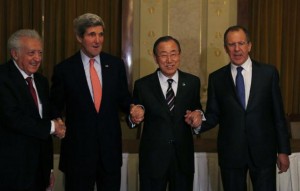U.S. Secretary of State John Kerry asked Russia’s foreign minister on Friday to put pressure on the Syrian government to accelerate the removal of chemical weapons, which Kerry said is not happening quickly enough, Reuters reported.
Kerry met Russia’s Sergei Lavrov on the sidelines of the Munich Security Conference to discuss what Washington considered to be “unacceptable” progress in moving Syrian chemical weapons, said a senior U.S. State Department official who spoke on condition of anonymity.
“Secretary Kerry pressed Foreign Minister Lavrov to push the regime for more progress on moving the remaining chemical weapons within Syria to the port in Latakia,” Reuters quoted the official as saying.
Russia earlier rejected U.S. charges that Syria is dragging its feet on giving up chemical weapons, saying that a June 30 deadline to destroy President Bashar al-Assad’s arsenal of toxic agents remains viable despite delays.
Kerry and Lavrov also discussed the next round of Syrian peace negotiations in February, stressing that they must focus on the political transition, the official said.
Meanwhile, international powers backing the Syrian opposition blamed Assad’s regime on Friday for the failure to make headway at peace talks in Geneva.
The Friends of Syria, an alliance of mainly Western and Gulf Arab countries, met in Geneva on Friday, shortly after the first round of talks ended, and called on Assad not to obstruct further rounds of talks.
“The regime is responsible for the lack of real progress in the first round of negotiations. It must not further obstruct substantial negotiations and it must engage constructively in the second round of negotiations,” Reuters quoted the group as saying in a statement.
Syrian Foreign Minister Walid Muallem said the week-long talks between the Syrian regime and the opposition Syrian National Coalition (SNC) in Geneva ended on Friday without tangible results.
While SNC’s chief Ahmed al-Jarba dismissed the failure of the talks, saying it was a success in itself to be holding negotiations with a regime which for long has claimed that it is the sole representative of the Syrian people.
But Jarba also accused the regime of showing no “serious commitment” during the peace talks.
“We cannot speak about a serious commitment by Assad’s representatives.”
U.N. humanitarian chief Valerie Amos deplored the failure of Syrian peace talks to produce a plan for getting aid to besieged communities, while momentum built for Security Council action to pressure the warring sides to allow access, the Associated Press reported.
“The situation is totally unacceptable,” Amos said. “We need urgent action now. Sieges must be lifted. Cease-fire agreements must be agreed and convoys allowed to proceed immediately and safely.”
Amos said more than three million people in Syria are trapped in areas of heavy fighting.
An agreement to allow aid convoys into the central city of Homs remains stalled, with Syrian officials demanding assurances that U.S. aid will not go to “armed and terrorist groups.” The government and opposition have accused each other of holding up the aid delivery into Homs, which has been under siege for nearly two years.
British Foreign Secretary William Hague said Friday his country “believes that there is a compelling case for bringing the humanitarian situation back under discussion in the Security Council.”
“We will discuss urgently with our partners what steps can be taken to ensure that aid reaches all those in Syria who need it,” he said.
Diplomats said Arab and Western countries have been working together on a Security Council resolution to pressure Syria’s warring sides to allow humanitarian access into the blockaded areas.
The diplomats had been waiting to see if the Geneva talks produced an agreement on Homs before moving ahead on a resolution.
Amos said the U.N. has yet to get an agreement from the Syria government to bring humanitarian aid to northwestern Hassakeh through a border point with Iraq, even though Iraqi authorities have already given their authorization.
She said a U.N. team that visited the area last week reported that people are running out of food. She said there has been no progress in getting aid into Eastern Ghouta, despite written guarantees from opposition groups.
Al Arabiya
Photo: (L-R) U.N. Special Representative for Syria Lakhdar Brahimi , U.S. Secretary of State John Kerry, U.N. Secretary-General Ban Ki-moon and Russian Foreign Minister Sergei Lavrov greet each other ahead of their meeting in Munich January 31, 2014. (Reuters)


Leave a Reply
You must be logged in to post a comment.